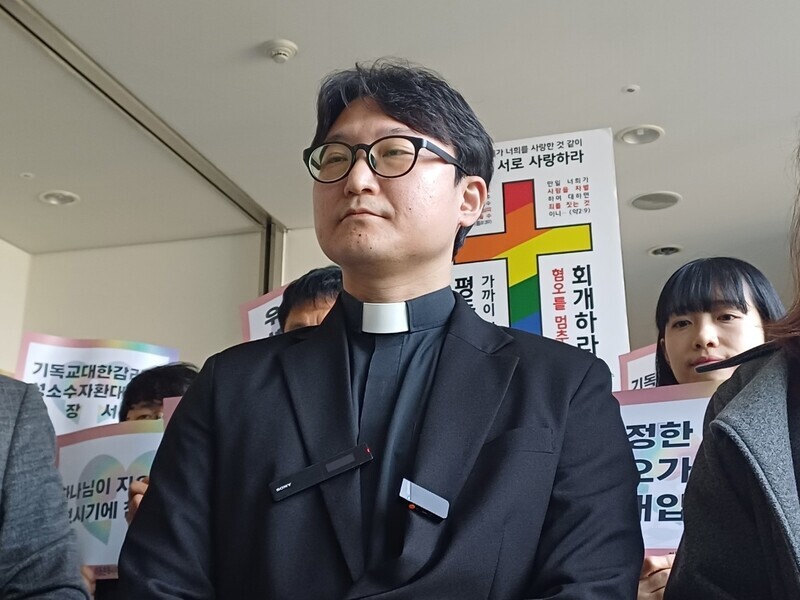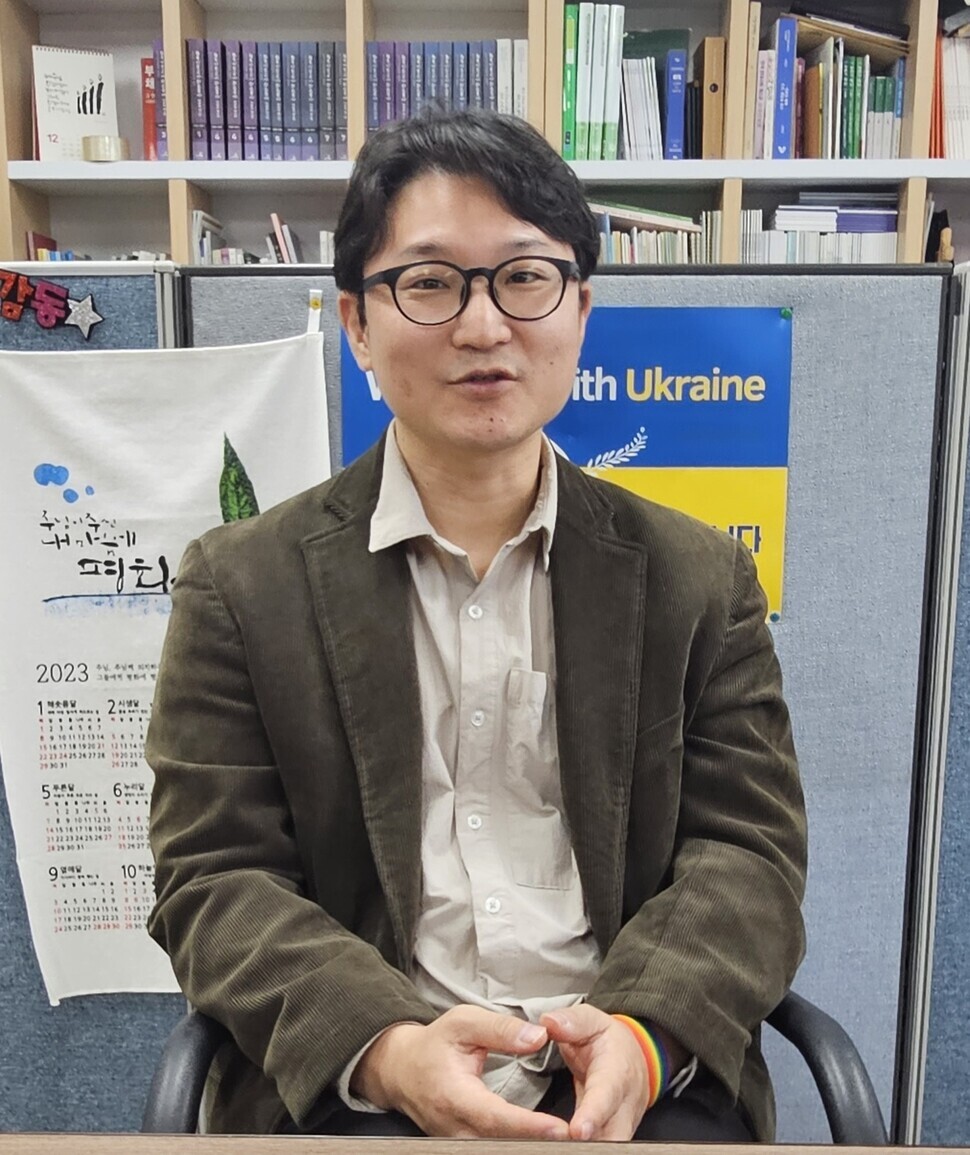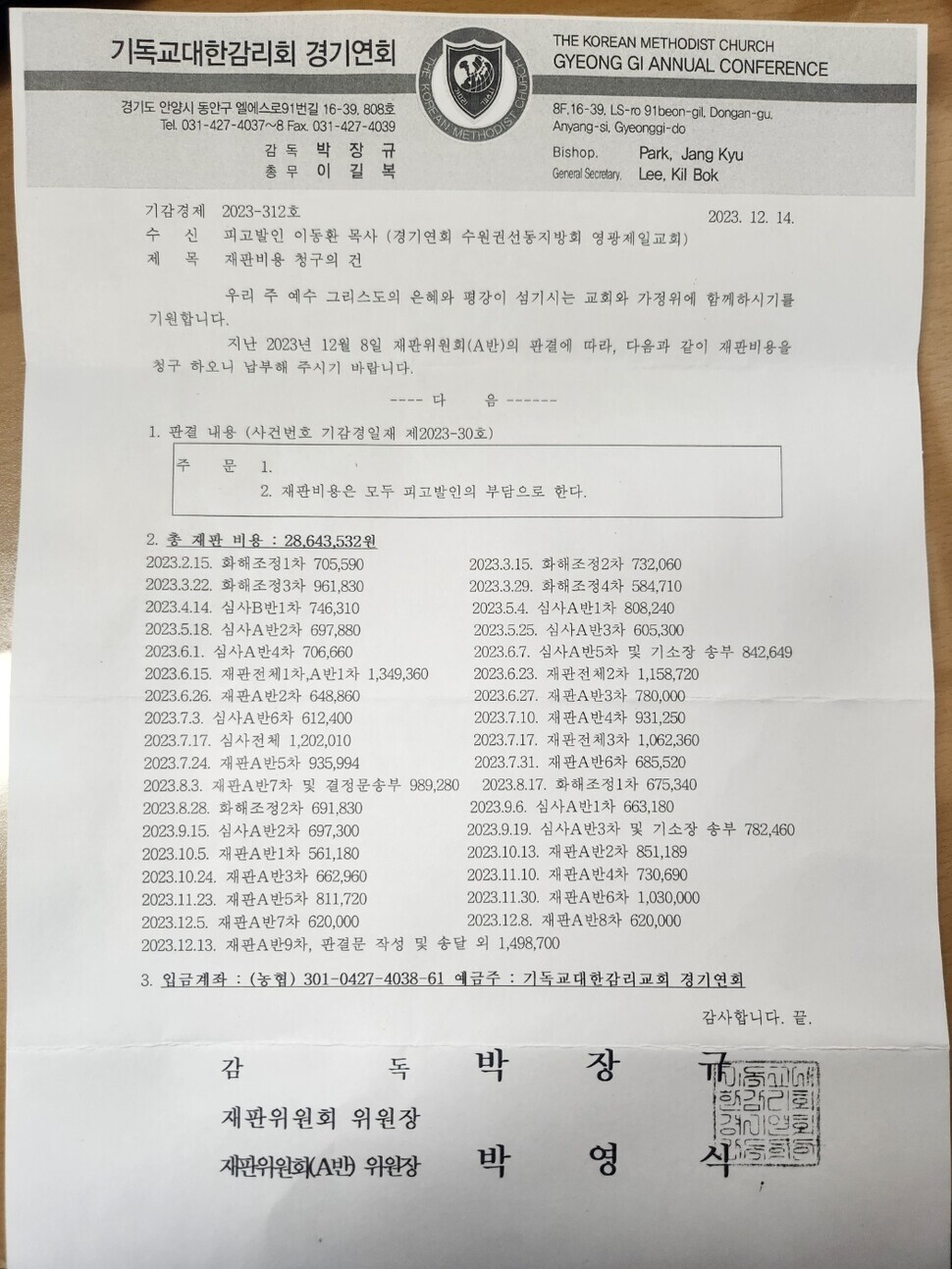hankyoreh
Links to other country sites 다른 나라 사이트 링크
Church slaps Korean pastor dismissed for performing blessings at Pride with major bill for trial

The Korean Methodist Church has slapped Rev. Lee Dong-hwan, who was defrocked in a tribunal for blessing sexual and gender minorities, with a bill for 28.6 million won (US$21,800) in judicial fees. To appeal, Lee will have to pay a total of 35 million won, including a 7 million won deposit.
The pastor has vocally disputed the charges, saying that the church is essentially using the fees to tell him to pack his bags and forgo an appeal.
On Monday, Lee received a bill from the Gyeonggi Annual Conference of the Korean Methodist Church for trial fees following his loss in the first church tribunal. The bill was for 28,64,2532 won in legal fees for 18 court dates between Feb. 15 and Dec. 13, 2023.
Lee posted a photo of the bill on his Facebook account and wrote, “My hands are shaking. How am I supposed to pay nearly 30 million won? They are basically telling me to leave [the church] and not even think about appealing.”
In order to appeal, Lee must pay 35 million won, including the court costs and a deposit, by Friday, which is the deadline for filing such an appeal. This is because, according to Article 56 of the Korean Methodist Church bylaws, the appellant must pay the trial fee for the first trial and the trial fee (deposit) for the appeal in advance.
“I only received the bill for the trial costs this morning, four days before the deadline for submitting the appeal,” Lee told the Hankyoreh.

Earlier, the Gyeonggi Annual Conference of the Korean Methodist Church sentenced Lee to disfellowship on Dec. 8, saying he violated Article 3(8) of the church’s Book of Doctrines and Discipline, which prohibits “advocating or sympathizing with homosexuality.”
Lee was taken to a Methodist tribunal in June on suspicion of blessing sexual and gender minorities at the second annual Incheon Queer Culture Festival, as the local pride events are called, in 2019, even after he had been suspended from pastor duties for two years for his actions at the festival.
The 28.64 million won charged to the pastor appears to be excessively high compared to the denomination’s normal trial costs. A typical tribunal costs around 7 million won, which is why the church set aside 7 million won as a deposit.
“The last trial cost about 7 million won, so I was expecting a bill around that size,” Lee said.
The bill included expenses incurred due to a mistake by the church’s judicial council that prolonged the trial. The trial was delayed when the charges were dropped after it was discovered that the “prosecutor” for the Gyeonggi branch of the church and Lee’s accuser belonged to the same district of the church, but Lee was charged for bills that occurred during that mishap.
In addition, costs incurred in the conciliation process (where the accuser and the accused meet with each other) and the examination committee process (where the accused is examined by a judge who acts as a prosecutor before the trial) were also tagged as trial costs and billed to Lee. The cost of the out-of-court proceedings amounted to approximately 10.22 million won.

Choi Jeong-gyu, an attorney at the law firm Wongok who is representing Lee, said, “I fail to see how the examination committee process, which is a role taken on by the Gyeonggi Annual Conference of the Korean Methodist Church, can be included as trial costs.”
Choi also pointed out that there were “two or three times when the trial committee failed to notify us of the deadline or send us the witness identification information properly.”
“The trial was not delayed because of Lee,” Choi added.
Lee said that he’s currently looking into how to pay for the trial, adding that he also submitted a letter of appeal and a motion to appeal the trial costs to the Korean Methodist Church.
By Chai Yoon-tae, staff reporter
Please direct questions or comments to [english@hani.co.kr]

Editorial・opinion
![[Column] Season 2 of special prosecutor probe may be coming to Korea soon [Column] Season 2 of special prosecutor probe may be coming to Korea soon](https://flexible.img.hani.co.kr/flexible/normal/500/300/imgdb/original/2024/0426/3317141030699447.jpg) [Column] Season 2 of special prosecutor probe may be coming to Korea soon
[Column] Season 2 of special prosecutor probe may be coming to Korea soon![[Column] Park Geun-hye déjà vu in Yoon Suk-yeol [Column] Park Geun-hye déjà vu in Yoon Suk-yeol](https://flexible.img.hani.co.kr/flexible/normal/500/300/imgdb/original/2024/0424/651713945113788.jpg) [Column] Park Geun-hye déjà vu in Yoon Suk-yeol
[Column] Park Geun-hye déjà vu in Yoon Suk-yeol- [Editorial] New weight of N. Korea’s nuclear threats makes dialogue all the more urgent
- [Guest essay] The real reason Korea’s new right wants to dub Rhee a founding father
- [Column] ‘Choson’: Is it time we start referring to N. Korea in its own terms?
- [Editorial] Japan’s rewriting of history with Korea has gone too far
- [Column] The president’s questionable capacity for dialogue
- [Column] Are chaebol firms just pizza pies for families to divvy up as they please?
- [Column] Has Korea, too, crossed the Rubicon on China?
- [Correspondent’s column] In Japan’s alliance with US, echoes of its past alliances with UK
Most viewed articles
- 1Is Japan about to snatch control of Line messenger from Korea’s Naver?
- 2‘We must say no’: Seoul defense chief on Korean, USFK involvement in hypothetical Taiwan crisis
- 3[News analysis] Using lure of fame, K-entertainment agency bigwigs sexually prey on young trainees
- 4[Column] Park Geun-hye déjà vu in Yoon Suk-yeol
- 5Will NewJeans end up collateral damage in internal feud at K-pop juggernaut Hybe?
- 6Up-and-coming Indonesian group StarBe spills what it learned during K-pop training in Seoul
- 7[Column] Season 2 of special prosecutor probe may be coming to Korea soon
- 8Korea’s 1.3% growth in Q1 signals ‘textbook’ return to growth, says government
- 9Report reveals toxic pollution at numerous USFK bases
- 10[Editorial] Statue should not be central concern of comfort women issue